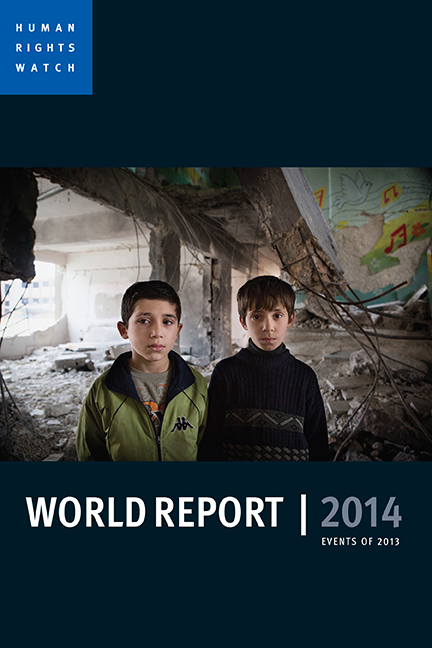Book contents
- Frontmatter
- Dedication
- HUMAN RIGHTS WATCH
- Table of Contents
- Foreword
- Rights Struggles of 2013: Stopping Mass Atrocities, Majority Bullying, and Abusive Counterterrorism
- The Human Rights Case for Drug Reform How Drug Criminalization Destroys Lives, Feeds Abuses, and Subverts the Rule of Law
- Putting Development to Rights: Integrating Rights into a Post-2015 Agenda
- The Right Whose Time Has Come (Again) Privacy in the Age of Surveillance
- Photo Essays
- AFRICA
- AMERICAS
- ASIA
- EUROPE AND CENTRAL ASIA
- MIDDLE EAST AND NORTH AFRICA
- UNITED STATES AND CANADA
- 2013 HUMAN RIGHTS WATCH PUBLICATIONS
- Acknowledgments
- Frontmatter
- Dedication
- HUMAN RIGHTS WATCH
- Table of Contents
- Foreword
- Rights Struggles of 2013: Stopping Mass Atrocities, Majority Bullying, and Abusive Counterterrorism
- The Human Rights Case for Drug Reform How Drug Criminalization Destroys Lives, Feeds Abuses, and Subverts the Rule of Law
- Putting Development to Rights: Integrating Rights into a Post-2015 Agenda
- The Right Whose Time Has Come (Again) Privacy in the Age of Surveillance
- Photo Essays
- AFRICA
- AMERICAS
- ASIA
- EUROPE AND CENTRAL ASIA
- MIDDLE EAST AND NORTH AFRICA
- UNITED STATES AND CANADA
- 2013 HUMAN RIGHTS WATCH PUBLICATIONS
- Acknowledgments
Summary
Libya's interim government faced multiple challenges in 2013. Myriad armed groups controlled security in many parts of the country, thousands of detainees remained in government and militia-controlled detention facilities without access to justice, and rampant ill-treatment and deaths in custody persisted. Forced displacement of tens of thousands of people from the town of Tawergha by militias from nearby Misrata had yet to be resolved.
Authorities failed to conclude any investigations into politically motivated assassinations, attacks on protesters in Benghazi and Tripoli, and attacks on journalists and foreign diplomatic missions, citing lack of resources and the precarious security situation.
Political Transition
The General National Congress (GNC), Libya's first elected parliament, has yet to fulfill its core mandate to organize elections for the Constituent Assembly (CA). On July 16, the GNC approved a law for electing the 60-member CA, which will draft Libya's constitution but at time of writing the law had not been issued, and the elections date had not been fixed.
The GNC suffered from political discord between its main political parties, in particular the Muslim Brotherhood-affiliated Justice and Construction Party (JCP) and the more liberal leaning National Forces Alliance (NFA); resignations by some Congress members; and removal of some congress members due to a sweeping lustration law that banned from office persons who had held any office in the Gaddafi era.
Security and Militias
The interim government failed to control deteriorating security in the country, especially in the capital, Tripoli, and in Benghazi, Libya's second largest city.
Myriad armed groups with varying agendas and allegiances, some affiliated with the government, controlled large swathes of the country and its resources—including Libya's oil terminals, its main income source—and operated with impunity. The government failed to demobilize militias or merge fighters who fought against Muammar Gaddafi's forces in the 2011 uprising into government forces with proper vetting procedures.
Authorities “contracted” militias, comprised of former revolutionary fighters, to help impose order, instead of prioritizing establishing a military and police force. These militias, including the Libya Shield Brigades and the Supreme Security Committee (SSC) that operated under the army chief of staff and Interior Ministry respectively, operated parallel to state security forces.
Attacks by unknown groups increased against foreign diplomatic missions in Tripoli and Benghazi, including the Tripoli embassies of France and the United Arab Emirates, and the Egyptian consulate in Benghazi.
- Type
- Chapter
- Information
- World Report 2014Events of 2013, pp. 577 - 584Publisher: Bristol University PressPrint publication year: 2014

